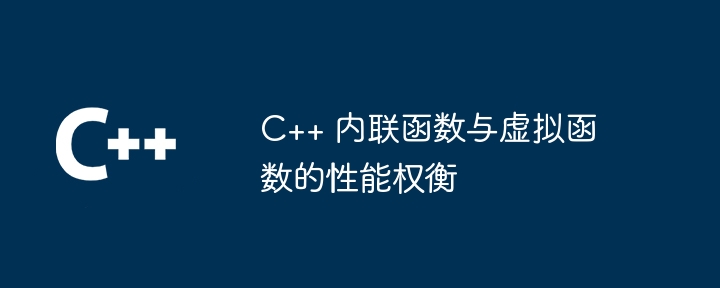
Inline functions usually perform better than virtual functions because they eliminate the function call overhead, but increase code bloat and difficulty in debugging; virtual functions provide polymorphism, allowing objects to call the correct method by type, and the code is clearer, but Performance is worse than inline functions.

C Performance trade-offs between inline functions and virtual functions
Introduction
Inline functions and virtual functions are two important techniques in C to improve code performance. However, the two methods have different performance characteristics and choosing the right technique is crucial in different situations. This article will delve into the performance trade-offs between inline and virtual functions and provide practical use cases.
Inline functions
Inline functions are a form of compiler optimization that inserts the function body directly into the calling function, thereby eliminating function call overhead . Inline functions are typically used for very small functions that perform only a few operations.
Virtual functions
Virtual functions allow derived classes to override base class methods. When a virtual function is called, the compiler dynamically binds to the most specific derived class implementation. This mechanism provides polymorphism but at the expense of function calls.
Performance comparison
Generally speaking, inline functions have higher performance than virtual functions because they eliminate function call overhead. However, inline functions also have the following disadvantages:
Virtual functions perform worse than inline functions, but they provide the following advantages:
Practical case
Case 1: Small calculation function
Consider the following function for calculating square roots:
inline double sqrt(double x) {
return std::sqrt(x);
}Since the function is small and only performs a few operations, it is a good choice to inline it. This will improve performance because it eliminates function call overhead.
Case 2: Virtual Method Call
Consider a simple shape class hierarchy with a Shape base class and Circle and Rectangle derived classes. Suppose the Shape class has a draw method as follows:
class Shape {
public:
virtual void draw() const = 0;
};Derived classes must override the draw method to implement specific drawing logic. When the draw method of a Shape object is called, the compiler dynamically binds to the most specific derived class implementation. This is necessary due to polymorphism, but it incurs function call overhead.
Conclusion
When choosing to use inline functions or virtual functions, it is important to weigh the needs for performance, code bloat, and polymorphism. Inline functions are suitable for small, frequently called functions, while virtual functions are suitable for situations where polymorphism is required. By judicious use of these techniques, you can optimize the performance of your C code.
The above is the detailed content of Performance trade-offs between C++ inline functions and virtual functions. For more information, please follow other related articles on the PHP Chinese website!
 What are the differences between c++ and c language
What are the differences between c++ and c language
 Recommended learning order for c++ and python
Recommended learning order for c++ and python
 Cost-effectiveness analysis of learning python and c++
Cost-effectiveness analysis of learning python and c++
 Is c language the same as c++?
Is c language the same as c++?
 Which is better to learn first, c language or c++?
Which is better to learn first, c language or c++?
 The difference and connection between c language and c++
The difference and connection between c language and c++
 C++ software Chinese change tutorial
C++ software Chinese change tutorial
 Cost-effectiveness analysis of learning python, java and c++
Cost-effectiveness analysis of learning python, java and c++




